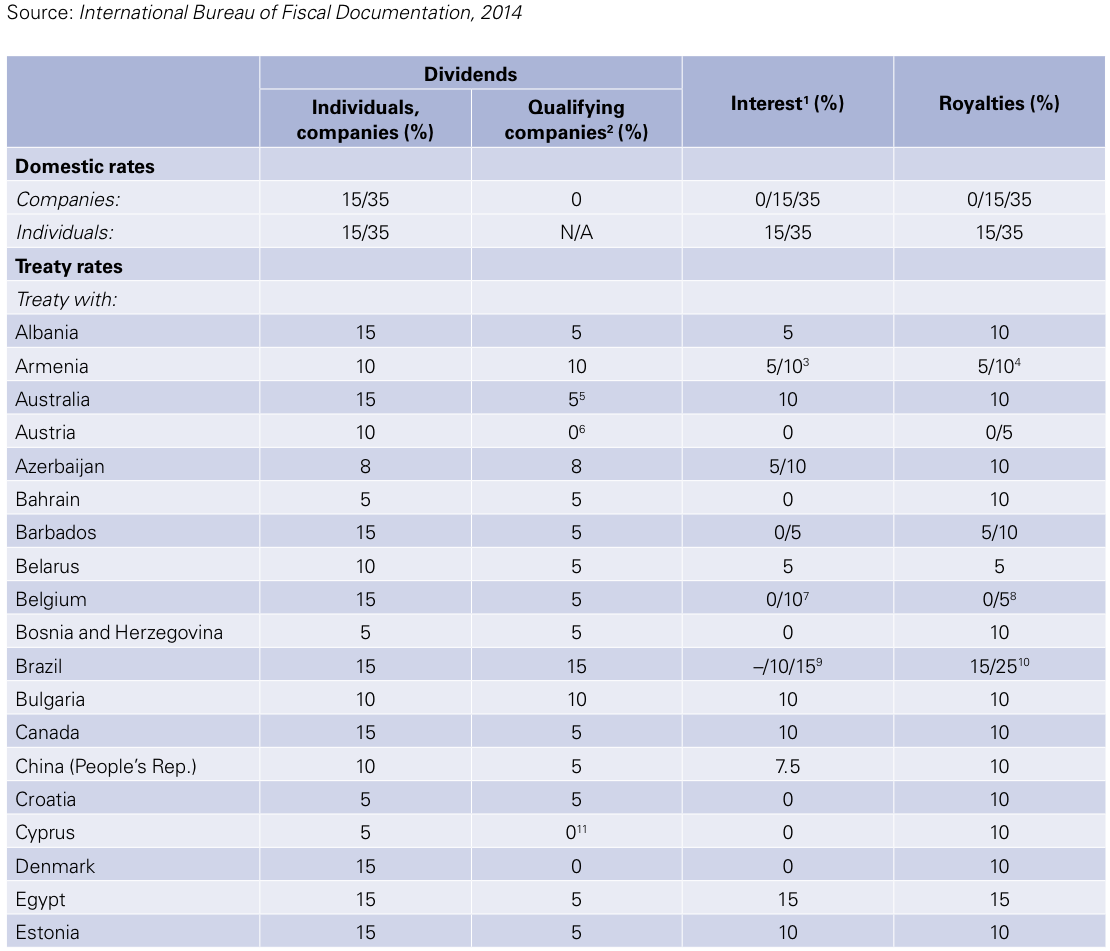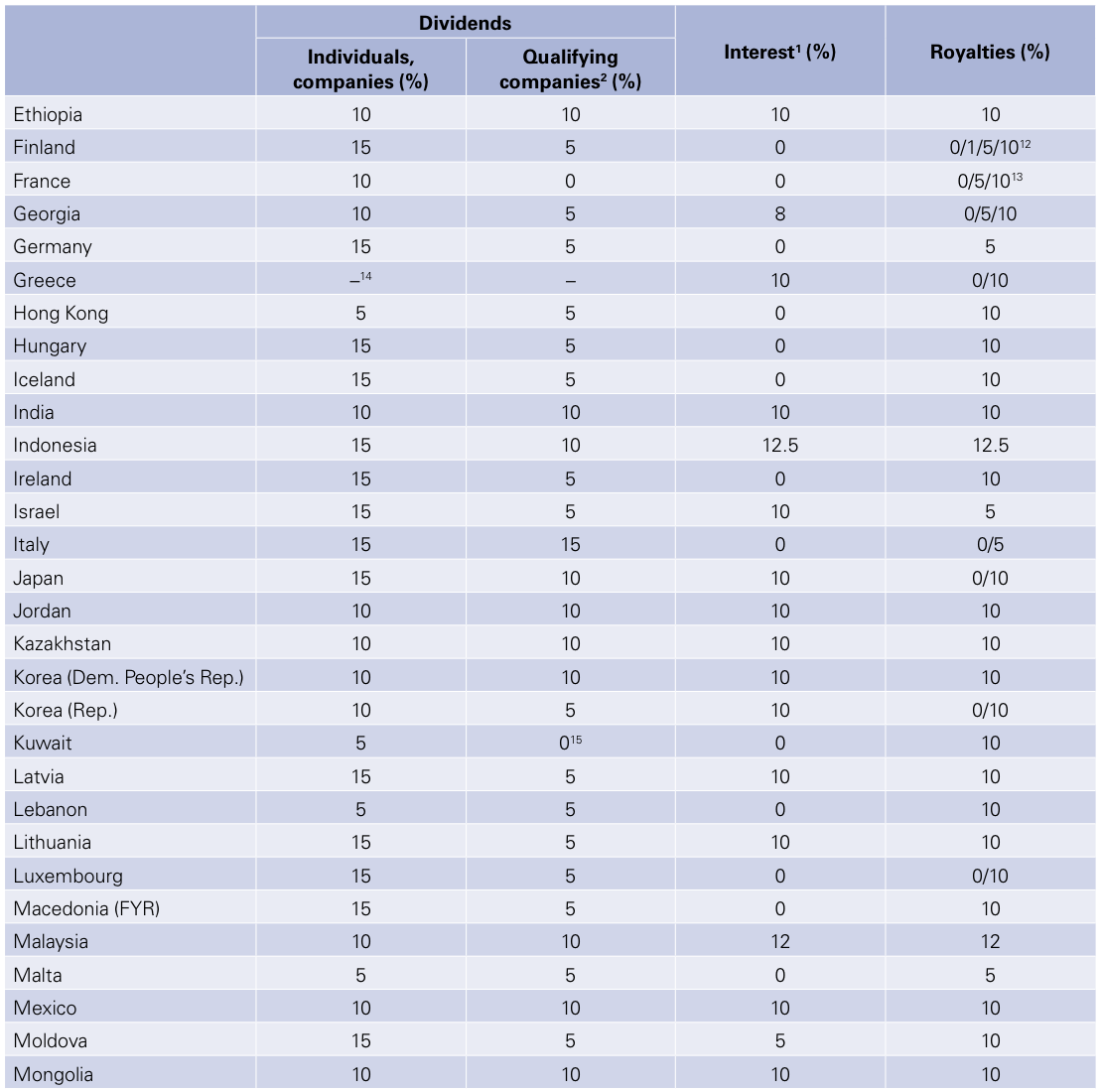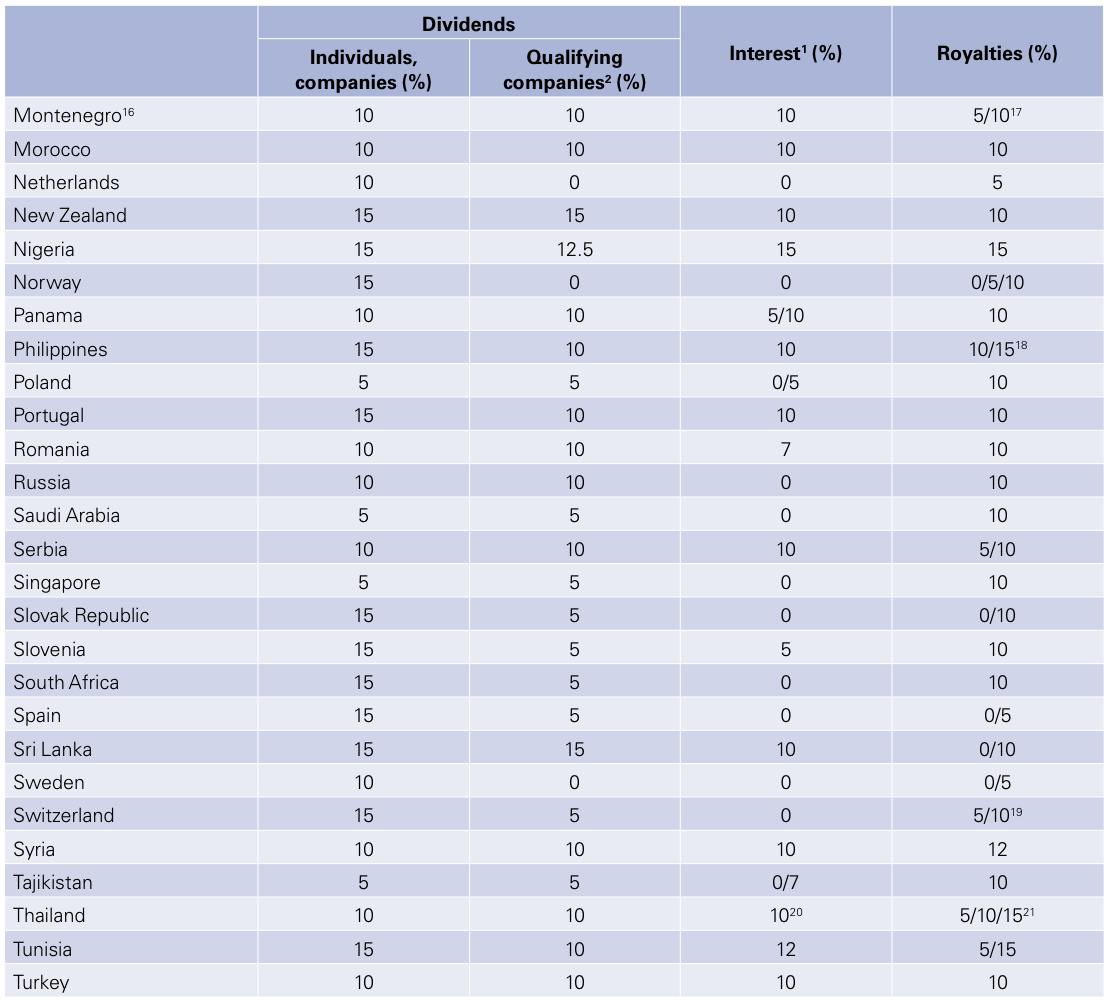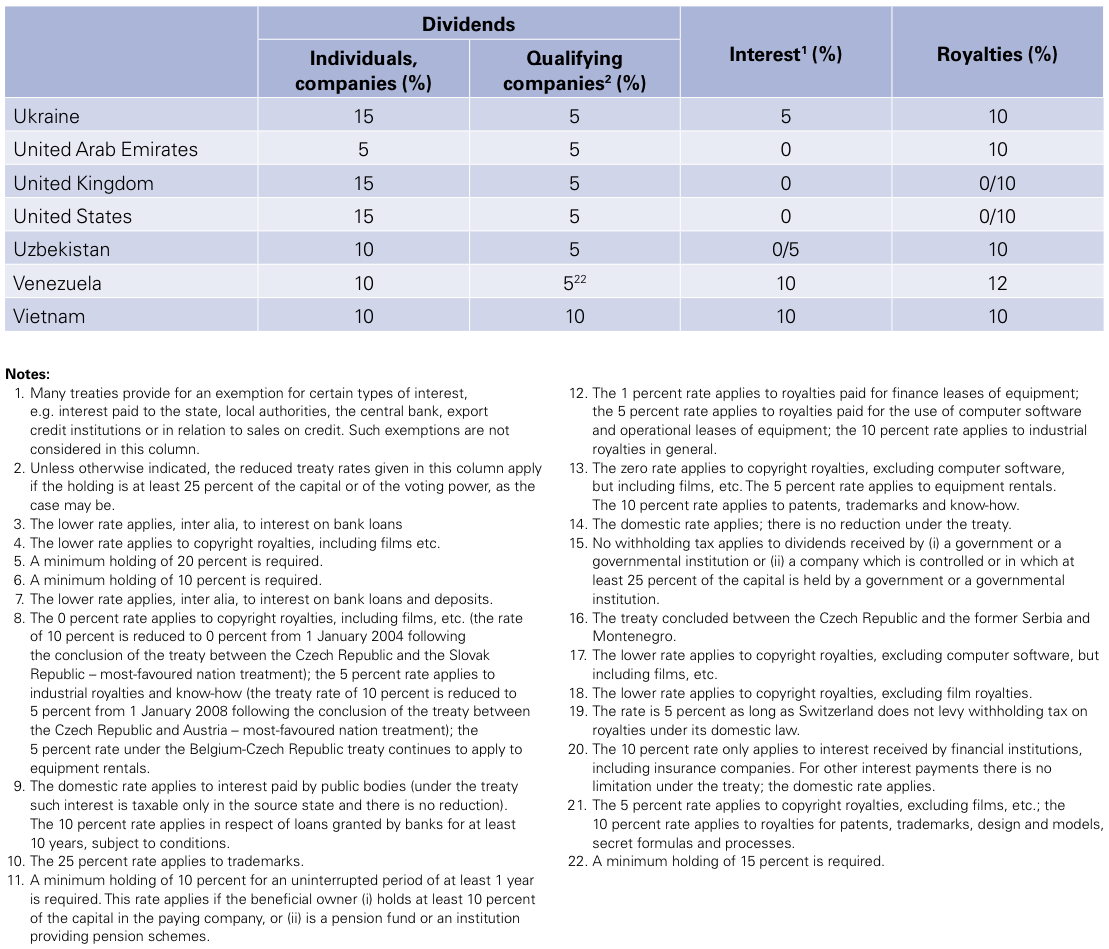
Publications Taxation Of Cross-Border Mergers And Acquisitions: Czech Republic 2014
- Publications
Taxation Of Cross-Border Mergers And Acquisitions: Czech Republic 2014
- Christopher Kummer

SHARE:
By KPMG
Introduction
Czech law contains a variety of special provisions applying to mergers and acquisitions (M&A) in areas such as company law, competition, environmental protection, accounting and tax. Unlike many jurisdictions, however, the Czech Republic had no detailed tax legislation dealing with M&A before European Union (EU) accession (1 May 2004), when legislation enacting the EU Merger Directive came into effect. Even after the enactment of these provisions, which in general simply repeat the terms of the directive, the accounting rules on reorganizations and acquisitions tend to determine many aspects of the tax effects.
In general, an acquisition can be structured as a purchase of either a legal entity or assets (possibly the entire business). Depending on the requirements of the purchaser, it may be appropriate to form a Czech legal entity to make the acquisition. Further reorganizations may be necessary after the acquisition to help maximize tax deductions.
The form chosen for an acquisition generally determines its tax consequences, although the tax authorities have the power to question the form where they believe the substance is different or there is an abuse of law. Whether the taxpayer enjoys the same advantage is uncertain but generally thought to be unlikely.
Recent developments
As of 1 January 2014, one of the most substantial reforms ever made to the Czech civil and commercial law became effective based on the adoption of three new laws: a Civil Code, the Corporations Act and the Act on Private International Law.
The transformation/organization of companies is not significantly affected by the changes and is still governed by the Act on Transformation of Companies.
Asset purchase or share purchase
There are two basic acquisition methods – asset deal and share deal.
Purchase of assets
The main tax effect of an asset deal is that the buyer has full tax basis in the assets acquired and the seller is subject to tax on any gain.
An asset deal may take one of two forms:
- purchase of an enterprise or part of an enterprise (an activity capable of being operated as a separate business)
- purchase of individual assets.
The main difference is that, in a purchase of an enterprise, the buyer takes over all the assets and liabilities of the seller, both disclosed and undisclosed. It is generally considered that tax liabilities do not transfer on a sale.
For the seller who realizes a gain, it is of little significance whether the sale is of assets or of an enterprise. In both cases, the gain is taxable at 19 percent and 15 percent (personal income tax). However, where the assets are sold individually, losses on the sale of some assets (such as receivables) are not tax-deductible.
Purchase price
The buyer and the seller can apportion the price between individual assets, and the tax authorities are unlikely to question this apportionment as long as the buyer and seller are not related.
Goodwill
In the case of a purchase of an enterprise, it is possible to carry out a valuation of the assets acquired that usually is accepted for the tax purposes of the buyer. Any part of the purchase price not attributed to the individual assets in the valuation is treated as goodwill, which can be depreciated for tax purposes over 15 years (5 years for accounting purposes). When no valuation is carried out, any difference between the price and the book value of the assets is classified as a valuation difference, which is depreciated for both tax and accounting purposes over 15 years.
No goodwill or valuation differences can arise on a purchase of individual assets. In this case, the whole purchase price is allocated between the individual assets.
The accounting and tax rules on goodwill also apply to negative goodwill, which arises where the price is lower than the value of the assets. Negative goodwill is treated as taxable income that is recognized over 15 years.
Depreciation
Generally, the buyer re-starts tax depreciation of the acquired assets (i.e. does not continue the depreciation policies of the seller) in both a sale of assets and sale of an enterprise.The buyer starts depreciating the new depreciation base, which is generally the purchase price plus related acquisition costs.
Tax attributes
Tax losses carried forward cannot be transferred in the case of an asset acquisition; they remain with the seller. Tax liabilities also remain with the seller.
Value added tax
The Czech Republic levies valued added tax (VAT) at 15 percent and 21 percent. Most goods and services are subject to the standard rate of 21 percent. A sale of assets is usually a taxable supply for VAT purposes, although some items are exempt from VAT or outside its scope (in which case a VAT clawback from input VAT previously claimed on the sold assets might arise). The sale of an enterprise is not a supply for VAT purposes; the seller remains entitled to a credit for any related input VAT.
In the case of a purchase of the whole or part of an enterprise, the acquirer may be obliged to repay input VAT claimed by the original owner on the purchase of fixed assets if the assets are used for VAT-exempt supplies in the future. The clawback period is 10 years for real estate (including improvements) and 5 years for other assets. The tax authorities do not recognize goodwill for VAT purposes. Where there is goodwill on a sale of assets subject to VAT (i.e. not an exempt sale of an enterprise), the goodwill element must be attributed to the other assets transferred, and VAT is imposed according to the classification of the assets.
Transfer taxes
There are no stamp or capital duties in the Czech Republic.
The only transfer tax that may apply on an acquisition is tax on the acquisition of immovable property (formerly real estate transfer tax), currently levied at 4 percent of the tax base.
The tax base is the higher of the agreed price and the reference value. The reference value is calculated by the tax authorities based on prices for similar transactions. If the tax authorities cannot calculate a reference value, the tax base is the higher of the agreed price and 75 percent of the value assessed by an expert. If real estate is transferred as part of an enterprise, the tax base is based on an expert valuation. The tax is payable by the transferor, although the parties can agree that it is paid by the acquirer.
Purchase of shares
In a share deal, there is no step-up for the buyer or the target in relation to any premium over the accounting/tax value of the target’s assets. The buyer inherits undisclosed liabilities, including the tax liabilities of the target company.
Corporations
The tax treatment of the sale depends on the status of the seller. In the case of a corporation, any gain on the sale is subject to corporate income tax of 19 percent as normal income unless the participation exemption applies. Gains on the sale of shares in a Czech subsidiary (10 percent holding for at least 12 months) are tax-exempt for Czech, EU, Icelandic and Nor wegian-resident corporate sellers. The exemption cannot be applied if the parent company or the subsidiary:
- is exempt from corporate income (or similar) tax
- may claim a corporate income tax exemption or corporate income tax relief, or
- is subject to corporate income tax at a rate of 0 percent.
Losses on disposal are not deductible, except in the case of shares in a joint stock company (a.s.) or European company (SE) held for trading purposes. The exemption also applies to sales of some non-Czech subsidiaries. A minimum of 10 percent should be held for at least 12 months, and the subsidiary must be tax-resident in either the EU or a country with which the Czech Republic has concluded a tax treaty and which has a corporate tax rate of at least 12 percent.
Individuals
In the case of an individual who has not treated the shares as a business asset, a gain on the sale of shares in a joint stock company or SE acquired before 31 December 2013 is tax-exempt where the securities have been held for more than 6 months and do not represent more than 5 percent of registered capital and voting rights for 24 months preceding the sale. Gains on the sale of securities acquired before 31 December 2013 representing more than 5 percent of registered capital and voting rights and any securities acquired from 1 January 2014 are exempt if held for 3 years. If the required holding period is not fulfilled, the gain is taxable at a rate of 15 percent.
No tax is payable where the taxable sales of securities do not exceed 100,000 Czech crowns (CZK) in a tax year.
A gain on the sale of an interest in a limited liability company (s.r.o.) is exempt from tax if it has been held for more than 5 years.
Where the buyer is a Czech tax-resident and the seller is not based in the EU or European Economic Area (EEA), the buyer is required to withhold security tax as an advance against tax payable unless treaty protection is available. The rates are 1 percent for income from the sale of investment instruments/shares in an a.s. and 10 percent for income from the sale of an interest in an s.r.o. The sale of shares in an a.s. and s.r.o. is exempt from VAT with no right to deduct input VAT.
Tax indemnities and warranties
In a share acquisition, the buyer is taking over the target company together with all related liabilities, including tax liabilities. Therefore, the buyer normally needs more extensive indemnities and warranties than in the case of an asset acquisition, where tax liabilities do not transfer.
Tax losses
Tax losses may be carried forward for 5 years. The tax law prevents the use of tax losses where there is a substantial change in the persons directly participating in the company’s equity or management and less than 80 percent of the company’s income in the year in which the loss is to be used is derived from the same activities as in the year when the loss arose. A change in the ownership of more than 25 percent of the registered capital or voting rights is always a substantial change. A taxpayer can apply to the authorities to confirm the availability of the carried forward losses after the end of the taxable period in which the losses are to be used.
Crystallization of tax charges
There are usually no exit charges on leaving the group. The main exceptions are:
- withholding tax (WHT) on dividends where the 12-month minimum holding period has not been met
- WHT on interest and royalties where the 24-month minimum holding period has not been met
- tax on the acquisition of immovable property is triggered by a sale of shares acquired in exchange for a contribution of real estate made before 2014 within 5 years.
Pre-sale dividend
Pre-sale dividends are rare in practice, particularly as the Czech commercial law prohibited interim dividends before 2014. If there is a qualifying corporate shareholding, both dividends and capital gains are exempt (i.e. the tax treatment does not differ). If the dividends are paid to an individual, there is no exemption from taxation; the dividends are always taxable while the gain can be exempt. Therefore, dividends are not usually tax-efficient.
Transfer taxes
There are no stamp or capital duties in the Czech Republic. Administration fees are payable on certain services rendered by various government bodies.
Tax clearances
Most transactions and reliefs are not subject to tax clearances. Some formalities need to be fulfilled for corporate reorganizations.
In a share deal, the seller is usually required to provide confirmation from the tax authorities that there are no tax arrears, although this does not preclude additional tax being assessed in the future.
A taxpayer can ask the tax authorities for a tax ruling relating to certain issues in advance (e.g. use of tax losses, transfer pricing). There is no general ruling system.
Choice of acquisition vehicle
Several potential acquisition vehicles are available to a foreign buyer, and tax factors often influence the choice. There is no capital duty on the introduction of new capital to a Czech company, including a Czech-registered SE or branch.
Local holding company
A Czech holding company is usually used as an acquisition vehicle where the buyer wishes to ensure that the taxable profits of the Czech target company can be offset against tax-deductible interest expenses from an acquisition loan. The company that makes the acquisition merges with the target so that the taxable income of the target and the expenses related to the acquisition are within one entity. Interest on acquisition loans is generally non-deductible. However, where the target company merges with the acquirer within one year, the interest expenses should qualify as tax-deductible, provided the taxpayer can demonstrate strong business reasons for the structure.
A decision to establish a Czech holding company also may be made for business reasons.
The legal forms most commonly used are limited liability companies and joint stock companies because only these two legal forms allow the exemption from taxation of profit distributions under the EU Parent-Subsidiary Directive. They also give limited liability to the shareholders. An SE could also function as an acquisition vehicle but is more administratively burdensome.
Foreign parent company
The foreign buyer might choose to acquire the Czech target company itself because it wishes to offset the interest on an acquisition loan against its own profits, which is possible in certain tax jurisdictions. As noted earlier, cross-border mergers of Czech companies are allowed but are more administratively demanding than mergers of two Czech companies.
Non-resident intermediate holding company
Non-resident intermediate holding companies were historically used where a relevant tax treaty provided more favorable tax treatment for capital gains or dividends. Now such companies are most often used if there will be no debt pushdown. EU holding companies usually qualify for the participation exemption. The intermediate holding company should be the beneficial owner of the shares.
Local branch
Under some circumstances, a foreign parent company may structure its investments through a Czech branch. Czech commercial law requires a branch to be registered where the foreign parent company systematically carries on business in the Czech Republic and has no local subsidiary.
Generally, the tax status of a Czech branch does not differ from the tax status of a local company (i.e. same rules for the tax base calculation, the same tax rate). However, there are some differences. For example, the distribution of profit by a Czech branch is not regarded as a dividend. There is no branch profits tax.
Joint venture
A joint venture can be either corporate (with the joint venture partners holding shares in a Czech company) or unincorporated (usually a partnership), which is (at least partially) tax-transparent.
Choice of acquisition funding
A buyer using a Czech entity to carry out an acquisition can finance the acquisition vehicle with debt, equity or a combination of both.
Debt
The principal advantage of financing an acquisition with debt is the potential interest deductibility, as opposed to the payment of dividends that are not tax-deductible. Any related expenses (e.g. loan arrangement fees) are usually deductible. Moreover, debt-financing has the advantage of avoiding a dilution of equity. Therefore, the costs of debt-financing are lower than the costs of equity. It is important to choose an acquisition vehicle that allows the offsetting of interest expenses against taxable income.
According to the Czech tax law, interest on loans taken out less than 6 months before the acquisition of a subsidiary is generally non-deductible (see later in the chapter). The tax-deductibility of interest on loans provided by a related party can also be limited by the Czech thin capitalization and transfer pricing rules.
Deductibility of interest
Expenses paid or payable for the purpose of earning taxable income are generally tax-deductible. Therefore, interest on acquisition financing should be deductible subject to transfer pricing and thin capitalization considerations. This general rule is subject to some exceptions:
- Interest paid by a Czech company is generally deductible on an accrual basis. However, where it is payable to an individual who does not keep double-entry books, it can only be deducted when paid.
- When the interest or other revenue is derived from the borrower’s profit, the financial expenses on the loans or credits are not tax-deductible.
- Interest should be incurred to earn taxable income. Dividends and other income subject to WHT as a final tax are not taxable income for this purpose.
- Expenses paid in connection with a holding in a subsidiary company are generally non-deductible. The law includes a rebuttable presumption that interest on loans taken out less than 6 months before the acquisition is paid in connection with the holding in the subsidiary. There is also a rebuttable presumption that 5 percent of distributions received from a subsidiary are disallowable indirect costs of holding the investment. Such costs can be added to the base cost of the shares when calculating gains on future disposals. The definition of ‘subsidiary’ for this purpose is drawn from the legislation enacting the EU Parent-Subsidiary Directive, which includes a requirement for the parent to hold 10 percent of the shares for at least 12 months.
A merger of the target with the holding company can mitigate the last two of these concerns. Alternatively, it is possible to convert the target into a tax-transparent entity, so that the buyer’s interest expense becomes deductible against its share of the profits of the target’s business. Strong business and economic reasons should exist to demonstrate that the restructuring is not tax-driven.
The Czech thin capitalization provisions restrict the deductibility of interest where the borrower has insufficient equity. Financial expenses arising from loans and credits received from related parties in excess of four times (six times for banks and insurance companies) the borrower’s equity are not tax-deductible. Interest on loans and credits received from unrelated parties, or those secured by a related party, is fully deductible on general principles, except for interest on back-to-back loans (i.e. where a related party provides a loan, credit or a deposit to an unrelated party, which then provides the funds to the borrower), which is treated as interest on related-party debt.
Notwithstanding these provisions, financial expenses incurred that directly relate to taxable income (e.g. interest income) can be deducted up to the amount of that income.
Withholding tax on debt and methods to reduce or eliminate the tax it
The Czech Republic levies WHT of 15 or 35 percent on interest payable to non-resident lenders. This is often reduced by a tax treaty to zero. Interest paid to certain associated EU resident companies is free of WHT under the EU Interest and Royalties Directive, provided the recipient is the beneficial owner of the interest and the entitlement to the exemption is confirmed by the tax authorities.
The 35 percent rate applies where the interest is paid to residents of countries that have no tax treaty with the Czech Republic or arrangement with the country for the exchange of information on tax matters.
The Czech tax law allows interest to be re-classified as a dividend where it is non-deductible due to a breach of the transfer pricing or thin capitalization rules. This can have adverse WHT consequences. This reclassification does not apply to EU or EEA lenders.
Interest paid by a Czech-resident company to a Czech-resident lender is not subject to WHT.
Checklist for debt funding
The following factors should be taken into account when debt funding is being considered:
- deductibility of interest connected with an acquisition of a company
- thin capitalization rules, where a loan is granted by a related party
- under transfer pricing rules, interest on a related-party loan should be set at arm’s length
- effective tax rate for the lender
- reduction in or exemption from WHT.
Equity
A buyer can use equity to fund the acquisition rather than debt. The main way to increase equity is by issuing new shares.
The main disadvantage of equity financing is dilution of the shareholders’ ownership (in the case of an increase of equity made disproportionately to the voting rights of each shareholder) and the non-tax-deductibility dividends. Equity financing generally is considered less preferable than debt financing.
However, in certain situations, equity financing might be preferable, such as where:
- The target company is a loss-making company.
- The debt-to-equity ratio is too high and exceeds the thin capitalization limits.
- A higher effective tax rate applies in the home country of the lender.
- Non-tax-related business reasons exist, such as credibility of a company or regulatory restrictions.
Tax-free corporate reorganizations
There are no comprehensive tax rules on corporate reorganizations. The rules that exist (enactment of the EU Merger Directive and the EU Directive on Cross-border Mergers) are intended to allow reorganizations to take place on a tax-neutral basis. The tax authorities have the power to challenge the intended tax effects of a transaction on the basis that the substance of the transaction is other than the form but, in practice, this is rare. Typical transactions are described below.
Contribution in kind
The Income Tax Act (ITA), section 30(10) requires the recipient of a contribution in kind to the capital of a company to continue the tax-depreciation policies of the person making the contribution. In the case of cross-border contributions to a Czech company, the recipient must continue the tax depreciation of the contributed assets based on the original purchase price of the contributed asset calculated in CZK on the date of contribution and using the Czech tax rules. Tax depreciation on the contributed assets can only be claimed up to the difference between the original purchase price and the tax depreciation already claimed by the contributor. Except where the EU Merger Directive applies (section 23a, ITA), the tax law is silent as to the treatment of the person making the contribution; however, according to the accounting rules, the contributor does not realize a gain in such a case but records the shares received at the net book value of the asset contributed.
Section 23a of the ITA does not refer to contributions of assets. The section refers only to a contribution of an enterprise or part of an enterprise as defined for the purposes of the Civil Code (i.e. an activity that can be operated as a separate business, as required by the Merger Directive, and including all liabilities, both disclosed and undisclosed) involving Czech and/or EU-resident companies (but excluding both types of Czech partnership). The legislation implies that transactions that do not meet its conditions (i.e. must involve Czech or EU-resident companies and must involve an enterprise, not merely assets) may be taxable. However, discussions with the Finance Ministry suggest that the law is not intended to tax transactions that do not fall within the terms of Section 23a of the ITA.
The law states explicitly that the person making the contribution does not realize a taxable gain and permits the transfer of reserves and tax losses that have arisen after EU accession (1 May 2004). Further, the law provides that the person receiving shares in exchange for a qualifying contribution should record these shares at market value for tax purposes.This does not apply where the contributor transfers the shares within one year. Moreover, tax attributes cannot be transferred where the main or one of the reasons for the contribution is to reduce or avoid the tax liability.
A contribution of assets that does not qualify as an enterprise is regarded as taxable supply for VAT purposes where the contributor claimed an input VAT deduction when the assets were purchased. The contributor and acquirer are jointly liable for the VAT. The contribution of some asset classes can be exempt from VAT (e.g. real estate) where certain conditions are met.
A contribution of an enterprise or part of an enterprise is not a a taxable supply for VAT purposes. Nevertheless, a company that receives an enterprise or part of an enterprise may be obliged to repay input VAT claimed originally by the contributor, where the fixed assets are later used for VAT-exempt supplies. The general clawback period is 5 years, extended to 10 years for buildings.
Until 31 December 2013, contributions of real estate to the registered capital of a company were exempt from real estate transfer tax where the contributor retained an interest in the recipient for 5 years. The exemption was cancelled for contributions from 1 January 2014.
There are no stamp or capital duties.
Merger
In a merger, the predecessor company ceases to exist without going into liquidation and all its assets and liabilities pass to the successor. There are no detailed tax rules on mergers except for cases dealt with by Section 23c of the ITA (which implements the EC Merger Directive). In general, a merger is tax-neutral. The transfer of fixed assets is at the tax residual value, and any goodwill arising cannot be depreciated for tax purposes. The parties to the merger can agree that reserves and provisions of the predecessor transfer to the successor. In the absence of such an agreement, they must be written back in the accounts of the predecessor except in the following cases:
- the transfer of all assets and liabilities of the dissolving company to an existing company in exchange for the issue of shares and, possibly, a cash payment by the successor to the shareholders of the dissolving company
- the transfer of all assets and liabilities of the dissolving company to a newly formed company in exchange for the issue of shares and, possibly, a cash payment by the successor company to the shareholders of the dissolving company
- the transfer of all assets and liabilities of the dissolving company to a company that is its 100 percent shareholder.
For qualifying mergers:
- No gain or loss is realized by the shareholders of the dissolving company on their disposal of its shares, except to the extent that they receive cash.
- The value of the shares received is equal to the value of the shares in the company that ceases to exist (i.e. no step-up in the value of the shares).
- Tax depreciation policies of the company that ceases to exist are continued by the successor(s).
- Tax losses arising after EU accession are transferred, provided that tax avoidance is not a main purpose of the transaction.
- Reserves and provisions are automatically transferred, subject to the same tax avoidance restriction as on the transfer of losses.
The companies concerned have to be resident in the Czech Republic or another EU Member State. Based on the EU Directive on Cross-Border Mergers, it is possible to merge a Czech company with any company registered in an EU Member State.
For accounting and income tax purposes (but not legally or for VAT purposes), it is possible for the effective date of a merger to be up to 12 months earlier than the date on which the application for registration of the merger is filed with the commercial court.
There are no real estate transfer tax, VAT or stamp/capital duties on a merger. Nevertheless, the successor may be obliged to repay input VAT claimed originally by the predecessor, where the fixed assets acquired are later used, for VAT-exempt supplies. The general clawback period is 5 years but is extended to 10 years for buildings.
Demerger
In a demerger, the predecessor company ceases to exist and its assets are transferred to two or more newly incorporated successor companies, which issue shares to the shareholders of the predecessor. Again, the ITA is generally silent on the effects except for the provisions implementing the Merger Directive legislation (Section 23c ITA). The same rules apply as in the case of a merger (with the necessary changes), namely, tax-neutrality with regard to transfers of assets, no tax deduction for the depreciation of goodwill, transfer of post-1 May 2004 tax losses, and possible transfer of reserves and provisions by agreement.
The successors may be obliged to repay input VAT originally claimed by the predecessor, where the fixed assets are later used for VAT-exempt supplies. The general clawback period is 5 years but is extended to 10 years for buildings.
Spin-off
A spin-off is an alternative to a demerger. The demerged company does not cease to exist, but the spun-off part is transferred to an existing or newly incorporated company. The spin-off is tax-neutral. The transfer of tax provisions, tax reserves and tax losses to the successor is possible to the extent that the transaction can be commercially justified.
There are no real estate transfer tax, VAT or stamp/capital duties. Again, the successor may be obliged to repay input VAT claimed originally by the demerged company, where the fixed assets are later used for VAT-exempt supplies.
Tax losses and reorganizations
When losses are transferred on a merger, demerger or spin-off, they can only be used against the profits derived from the activity that generated them. Similarly, any losses of the surviving company can be used only against the profits generated by the same activity. Where an activity is transferred through a contribution of an enterprise, the losses transferred can only be used against the profits of the activity transferred, but there is no restriction on the use of the losses by the transferee.
Hybrids
A buyer can combine both debt and equity to achieve the desired debt-to-equity ratio.
Generally, the Czech law does not deal with hybrid instruments, and the tax treatment tends to follow the legal form (subject to the substance-over-form rule).
Discounted securities
The tax treatment of securities issued at a discount to third parties generally follows the accounting treatment. The discounted amount should be written-off over the period until maturity. Under domestic legislation, interest paid to non-residents and the accrued discount are both subject to 15 percent WHT, subject to reductions under a relevant tax treaty or the EU Interest and Royalties Directive. The law is not clear as to whether the thin capitalization provisions apply to discounts.
Deferred settlement
An acquisition often involves an element of deferred consideration, the amount of which can only be determined at a later date on the basis of the post-acquisition performance of the business. The right to receive an unknown/conditional future amount should not be recognized for either tax or accounting purposes, applying the prudence principle. Where receipt of an agreed amount is simply deferred without conditions, it is recognized as taxable income at the time of the sale.
Other considerations
Both the substance-over-form rule and the abuse of law concept need to be taken into account when structuring transactions. The tax authorities have the power to ignore the strict legal form and adjust the tax effects of any transaction based on these concepts. The abuse of law doctrine applies where a person exercises their rights to the detriment of others or society in general. The Czech courts should not provide legal protection to such an exercise of rights that is, at the same time, an abuse of those concepts.
For example, where a holding company is merged with its target company, the participating companies should document and justify proper business reasons for the transaction in order to prove that the transaction is not designed solely to obtain tax benefits or avoid taxation. There is currently little clear guidance from the courts or the authorities in this area.
Concerns of the seller
As the Czech tax law provides for an exemption from the taxation of capital gains for many sellers, this is usually the main area of concern.
Company law and accounting
The Czech company law provides for the following legal entities:
- general partnership (v.o.s.)
- limited partnership (k.s.)
- European company (SE)
- limited liability company (s.r.o.)
- joint stock company (a.s.).
The shareholders of an s.r.o. are liable for the unpaid liabilities of the company up the total amount of unpaid contributions to the registered capital. The shareholders of an a.s. or an SE (governed by Czech law) are not liable for the unpaid obligations of the company. The SE has several tax advantages, but it is administratively demanding to establish and so it is not often used.
A general partnership is a tax-transparent entity. A limited partnership is partly tax-transparent (for the income apportioned to the general partner). The main disadvantage of these two legal forms is the unlimited liability of the general partners. The partners in a v.o.s. are liable for all unpaid liabilities of the partnership. In the case of a k.s., a general partner is fully liable for unpaid liabilities, while a limited partner is only liable up to the amount of unpaid contributions to capital.
Generally, the Czech accounting rules are governed by the Act on Accounting. Further detailed guidance is provided in the Decrees on Double-Entry Accounting and Czech National Accounting Standards. All businesses registered in the Czech Commercial Register are obliged to use double-entry bookkeeping. The accounting period generally is defined as a period of 12 consecutive months. The accounting unit can either use a calendar year or specify a business year-end other than 31 December. Statutory financial statements consist of a balance sheet, a profit and loss account and notes. The Act on Accounting states that certain business units are subject to mandatory statutory audits and must prepare separate annual reports. Additional filings may need to be made in the event of a reorganization.
Group relief/consolidation
There is no tax consolidation for Czech corporate tax purposes. Thus, the use of a highly leveraged Czech holding company to acquire a target is ineffective for tax purposes unless followed by a merger or a transformation of the target to a partnership.
Transfer pricing
Generally, prices between related parties should be set at arm’s length. The Czech ITA has a broad definition of related parties. While it does not provide for mandatory transfer pricing documentation, guidelines have been issued that describe standards that the tax authorities expect to be followed. A taxpayer can ask the tax authorities for an advance tax ruling relating to the arm’s length price.
Dual residency
The Czech ITA defines a resident company as one that has its seat in the Czech Republic or whose place of effective management is in the Czech Republic. As of 2012, the seat of a Czech company can be transferred outside the Czech Republic, which can result in a change of tax residency. Czech-resident foreign companies are very rare. A pure change of the place of management of a Czech company outside the Czech Republic should not affect its tax residency in the Czech Republic.
Foreign investments of a local target company
There is no controlled foreign company (CFC) legislation in the Czech Republic. As noted earlier, Czech tax law contains a substance-over-form rule and an abuse of law concept, which should be considered.
Comparison of asset and share purchases
Advantages of asset purchases
- The purchase price, including goodwill, can be depreciated for tax purposes.
- Interest payable on borrowings is generally deductible.
- Except in the case of a purchase of an enterprise, liabilities are not inherited (even then, tax liabilities should be excluded). However, in certain circumstances, the acquirer may be jointly liable for related debts where they knew or should have known about them.
- It is easier to acquire only part of a business.
Disadvantages of asset purchases
- Additional legal formalities apply in the areas of notification of suppliers, change of name and employment law (although on a purchase of an enterprise, employment contracts transfer automatically).
- Where only assets are purchased, the initial price is usually higher.
- Where the vendors are individuals, the existence of exemptions from tax for sales of companies makes this structure much less attractive.
- Tax losses are not acquired.
- Complications may result from rules on the allocation of the purchase price on the purchase of an enterprise.
- The tax on acquisition of immovable property (real estate transfer tax) for the vendor may affect the price.
- Possible VAT clawbacks, if the transaction is VAT-exempt or if the business makes VAT-exempt supplies in the future.
Advantages of share purchases
- Attractive to vendors, especially if they are individuals or exempt from corporate tax on any gains.
- Possible to use historical tax losses, subject to restrictions.
- Contracts with suppliers, employees and others automatically transfer.
- No real estate transfer tax or capital taxes.
Disadvantages of share purchases
- There is no tax deduction for the purchase price until shares are sold.
- Interest deductibility may be restricted unless a merger follows the acquisition.
- Buyer inherits all undisclosed liabilities of the target company, including tax liabilities.
- No step-up in the cost base of assets is possible
Czech Republic – Withholding tax rates
This table sets out reduced WHT rates that may be available for various types of payments to non-residents under the Czech Republic’s tax treaties. This table is based on information available up to 1 February 2013.




TAGS:


Stay up to date with M&A news!
Subscribe to our newsletter


